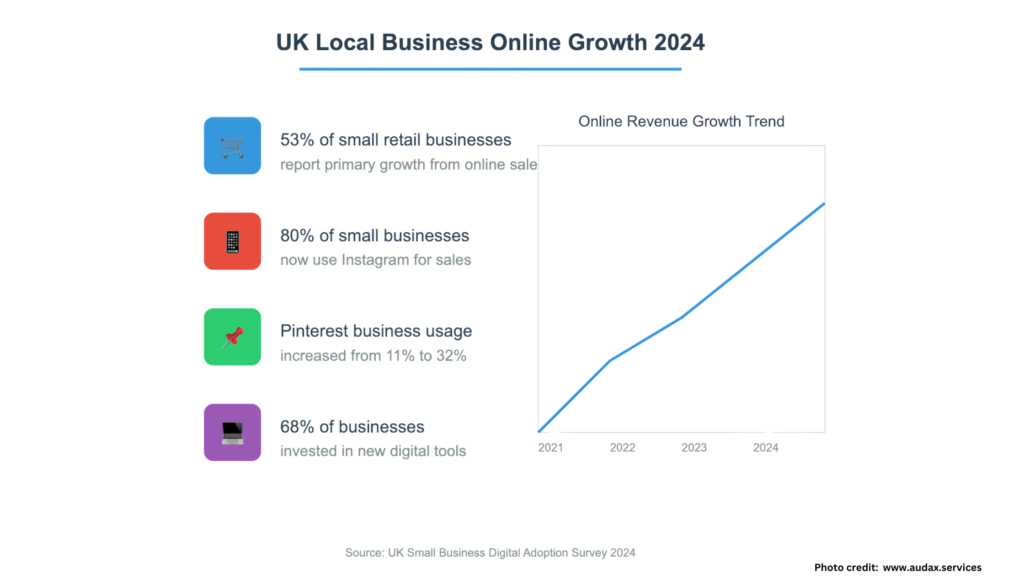
Why Local Businesses Are Thriving Online in 2025: A Comprehensive UK Guide
Introduction
The landscape of local business in the United Kingdom has undergone a remarkable transformation in recent years. As we progress through 2025, we’re witnessing an unprecedented surge in local businesses finding success through digital channels. This shift isn’t merely a trend but a fundamental reorganization of how British enterprises operate and connect with their communities.
The Digital Revolution of Local Enterprise
The New Digital Main Street
Gone are the days when local businesses relied solely on foot traffic and word-of-mouth advertising. Today’s British high street extends far beyond physical boundaries, reaching into the digital realm where local shops can compete with national chains on equal footing. According to recent data, 53% of small retail businesses report that their primary sales growth now comes from online or e-commerce platforms.
Technology Democratization
The barriers to entry for online business have significantly decreased. Small businesses in the UK now have access to the same powerful tools and platforms that were once the exclusive domain of large corporations. From sophisticated e-commerce platforms to advanced analytics tools, technology has become more accessible and affordable than ever before.
Key Drivers of Online Success
1. Social Media Revolution
Social media has become the new shop window for local businesses. The statistics are compelling:
- 80% of small retail businesses now use Instagram for sales
- Pinterest usage among UK businesses has nearly tripled, from 11% to 32%
- Local businesses are leveraging platforms like TikTok and Facebook to create authentic connections with their communities
2. E-commerce Evolution
The e-commerce landscape has evolved to favor local businesses:
- Simplified payment systems
- Integration with local delivery services
- Click-and-collect options
- Mobile-first shopping experiences
3. Community Connection in the Digital Age
Local businesses are maintaining their community roots while expanding their digital presence:
- Virtual events and workshops
- Online loyalty programs
- Local social media engagement
- Digital community partnerships

Economic Advantages of Going Digital
Cost Efficiency
Local businesses are finding significant cost advantages in the digital space:
- Reduced overhead costs
- Lower marketing expenses
- Flexible staffing options
- Automated operations
Market Expansion
While maintaining their local identity, businesses are reaching new markets:
- Cross-regional sales opportunities
- International customer access
- Niche market penetration
- Expanded product offerings
Technology Tools Driving Success
Essential Digital Infrastructure
Modern local businesses are leveraging:
- Cloud-based point of sale systems
- Inventory management software
- Customer relationship management (CRM) tools
- Digital payment solutions
Data-Driven Decision Making
Small businesses are utilizing:
- Analytics tools
- Customer behavior tracking
- Predictive inventory management
- Targeted marketing campaigns
Challenges and Solutions
Common Obstacles
Local businesses face several challenges:
- Digital skills gap
- Online competition
- Technology integration
- Customer trust building
Proven Solutions
Successful businesses are:
- Investing in training and education
- Focusing on unique value propositions
- Adopting integrated technology solutions
- Building strong online reputations
Success Stories
Case Study 1: The Local Bakery Goes Digital
The Warm Crumb Bakery in Manchester exemplifies the successful transition from traditional to digital business. Started by Sarah Thompson in 2019 as a small local bakery, the business faced significant challenges during the pandemic. Rather than scaling back, Sarah invested in digital transformation:
- Created an interactive website featuring daily specials and custom order capabilities
- Implemented an Instagram strategy showcasing behind-the-scenes content and daily fresh bakes
- Developed a local delivery service integrated with their online ordering system
- Launched virtual baking classes for regular customers
The results were remarkable:
- 300% increase in revenue from 2022 to 2024
- Customer base expanded from local neighborhood to greater Manchester area
- Successfully maintains both physical and online presence
- Created additional revenue stream through online baking tutorials
Case Study 2: Traditional Crafts Meet E-commerce
Yorkshire-based Potter’s Wheel, run by Master Potter James Wilson, demonstrates how traditional crafts can thrive in the digital age. The 40-year-old pottery business transformed its operations by:
- Building an e-commerce site featuring detailed product galleries and craft stories
- Creating video content showing the pottery-making process
- Offering virtual pottery workshops to international audiences
- Developing a subscription box service for pottery enthusiasts
Key achievements:
- Exports now account for 60% of sales
- Online workshops reach students in 15 countries
- Revenue grew by 250% between 2022 and 2024
- Successfully maintained craft authenticity while scaling digitally

Future Trends and Predictions
Emerging Technologies
- AI and machine learning applications
- Augmented reality shopping experiences
- Voice commerce integration
- Blockchain for small business
Market Evolution
- Hybrid shopping experiences
- Sustainable business practices
- Personalized customer journeys
- Community-focused growth
Practical Guide for Local Businesses
Getting Started Online
Step-by-step guide for:
- Website creation
- Social media presence
- E-commerce integration
- Digital marketing basics
Scaling Strategies
Advanced techniques for:
- Market expansion
- Customer base growth
- Product line development
- Service enhancement
Conclusion
The digital transformation of local businesses in the UK represents more than just a trend—it’s a fundamental shift in how enterprises operate and connect with their communities. As we progress through 2024, the opportunities for local businesses to thrive online continue to expand. Success in this new landscape requires a balanced approach: maintaining local charm while embracing digital innovation.
Are you ready to take your local business online or enhance your existing digital presence? Start by assessing your current digital capabilities and identifying areas for growth. Remember, the journey to online success is a marathon, not a sprint. Begin with small, manageable steps and build upon your successes.
FAQ Section
How much does it cost to take a local business online in the UK?
Initial costs can vary significantly based on your needs and approach:
Basic Setup (£500-£1,500):
- Domain name: £10-15/year
- Website hosting: £50-150/year
- Basic website template: £0-300
- Essential business software: £200-500/year
- Payment processing setup: £0-200
Professional Setup (£2,000-£5,000):
- Custom website design
- Professional branding
- E-commerce integration
- Basic marketing automation
- Staff training
Advanced Setup (£5,000+):
- Custom e-commerce solution
- Advanced integrations
- Professional photography/videography
- Comprehensive digital marketing strategy
- Advanced security features
Monthly Operating Costs:
- Website maintenance: £50-200
- Digital marketing: £200-1000
- Software subscriptions: £100-500
- Payment processing fees: 1.5-3% per transaction
What are the most effective digital marketing channels for local businesses?
Based on 2024 UK market data, the most effective channels are:
Social Media (High ROI):
- Instagram: Best for visual products and services
- Facebook: Excellent for community building and local targeting
- TikTok: Growing rapidly for younger audience engagement
Search Engine Marketing:
- Local SEO: Essential for geographic targeting
- Google Business Profile: Critical for local visibility
- Paid search: Effective for immediate results
Email Marketing:
- Average ROI of £42 for every £1 spent
- Excellent for customer retention
- Highly effective for promotional campaigns
Content Marketing:
- Blog posts for SEO and authority building
- Video content for engagement
- User-generated content for authenticity
How can local businesses compete with larger online retailers?
Successful strategies include:
Differentiation:
- Focus on unique, locally-sourced products
- Offer personalized customer service
- Create exclusive products or services
- Emphasize community connection
Service Excellence:
- Provide same-day local delivery
- Offer click-and-collect services
- Implement loyalty programs
- Provide expert product knowledge
Digital Advantages:
- Use local SEO to dominate geographic searches
- Leverage social proof through reviews
- Create personalized shopping experiences
- Build community through social media
What government support is available for UK businesses going digital?
Current government initiatives include:
Financial Support:
- Help to Grow: Digital scheme (up to £5,000 in discounts)
- Regional growth hub grants
- Innovation vouchers
- R&D tax credits for digital development
Training Programs:
- Digital Skills Bootcamps
- Small Business Leadership Programme
- Digital Marketing apprenticeships
- Local Enterprise Partnership training
Additional Resources:
- Free business advice through Business Support Helpline
- Cyber security guidance and support
- Digital adoption workshops
- Online business toolkits
How long does it typically take to establish a successful online presence?
Timeline expectations:
Immediate Results (1-3 months):
- Basic website setup
- Social media profiles
- Google Business Profile
- Initial online listings
Medium-term Goals (3-6 months):
- Consistent social media engagement
- Regular customer reviews
- Basic SEO improvements
- Steady online sales growth
Long-term Success (6-12 months):
- Strong search engine rankings
- Established online brand presence
- Stable customer base
- Predictable revenue growth
Key factors affecting timeline:
- Industry competitiveness
- Marketing budget
- Resource allocation
- Technical capabilities
- Content quality and frequency

Very Good
The landscape of local business in the United Kingdom has undergone a remarkable transformation in recent years. As we progress through 2025, Edit your profile we’re witnessing an unprecedented surge in local businesses finding success through digital channels. This shift isn’t merely a trend but a fundamental reorganization of how British enterprises operate and connect with their communities.